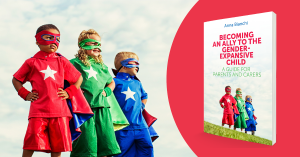“I had no premonition, when my first grandchild was born, that I would be writing this book. How could I know that Ruben’s birth would lead me to question many of my essential ‘truths’ about being male or female? That his small fierce journey across the landscape of gender would take me on one of my own? That Ruben’s insistence on living his own truth would inspire me to live mine more fully? None of us knew then that my grandson, soon to be celebrated in every hue of blue, would undo our gender bearings. These were impossible circumstances to imagine the morning Ruben arrived. I simply held him to my heart and gazed into his face, as surely in-love as I’ve ever been in the whole of my life…” p.11, Becoming an Ally to the Gender-Expansive Child
My journey of grand-mothering a child who is gender-expansive continues. A child who, now, is a girl and is happy; Ruby. The day when my daughter Jude rang, to ask me what I thought of her buying ‘girl’s’ shoes for Ruben instead of ‘boy’s’ ones, seems light-years away now. I remember how she and I travelled backwards and forwards together in the conversation, puzzling and protesting, then back to puzzling again about what the ‘right’ decision might be. At the time the dilemma felt huge and in many ways it was. Looking back it symbolised a turning point, though neither of us were aware of this at the time. It also marked out a willingness to listen, to really listen, to what our little one had been expressing for sometime; to his father, his mother and to me. So it felt radical when Jude acted on what she heard. And it was this realisation, that buying a ‘boy’ child girl’s footwear was somehow outrageous, that prompted me to look inwards at my baffled self and ask why? What exactly was the danger here? And why did it feel so real? These questions, and many others, have continued to sit at my shoulder over the four years from then until now. As Ruby’s gender-journey proceeds, and as she grows and develops, more questions will grip me accordingly. How can they not? My grandchild is on the path less travelled, as are we, her family. Often times it’s a taxing place to be. The need for answers, for security, is a compelling force in the human psyche. And yet I know if I compliantly hand myself over to this need, the risk is my security will cost Ruby her’s. I’ve learnt to take some comfort in the words of the poet Rilke, “Be patient toward all that is unsolved in your heart and try to love the questions themselves, like locked rooms and like books that are now written in a very foreign tongue…” Learning to love the questions is a big ask. But when I don’t, when I insist on answers, then they transmute into tormentors that steal all my joy. And this does not serve me, Ruby, or my family.
Parents and carers of gender-expansive kids who are accepting, challenge the status quo. We need allies too and for good reason. Our children encounter difficulties that many others don’t. Just a few weeks ago Ruby’s parents were presented with a question related to gender identity. How and where should Ruby get changed for swimming lessons in her new class? Some of the children know she is trans and some don’t. How fortunate we are that she’s in a school that does some of its professional thinking ahead of us. Unbelievably fortunate. In partnership with the Head and class teacher, a strategy was agreed upon that both protects Ruby and doesn’t mark her out as different. Other questions won’t so easily be resolved, yet good results are an extremely valuable commodity. Not least because they set a standard. They give us as parents and carers something to measure other experiences against. They place responsibility for an outcome appropriately, rather than foisting it on to a child exclusively. Good results arise out of an attitude of sensitive engagement, not one where our child’s situation is regarded as a problem to be targeted, erased or ignored. When we can compare and contrast in this way, we understand that poor outcomes are often the result of ignorance, prejudice and a reluctance to power-share in the circles that surround our child. Our kids are highly vulnerable to these dynamics, so our education about these things is an imperative. I’m glad to be taking this journey with so many others. It’s easier to bear the questions I have, when I know the answers can be discovered in partnership with our allies, and with each other.
For more information or to buy the book, follow this link.
Why not follow us on Facebook @JKPGenderDiversity or Twitter @JKPBooks for more exclusive content from our authors.

Young people are growing up in an era when gender can be more fluid. I think we need more parents, grandparents and carers to tell their stories – and to make trans people feel more accepted in a culture that still has preconceived ideas about gender identity.